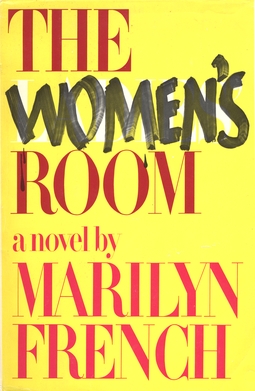A boy in The Women's Room
May 6, 2009 — Living as we do mostly and more or less in the present, when female soldiers are coming home from Afghanistan in body bags, women are routinely running for public office and blasting off into space as astronauts, it is easy to lose sight of just how much and how quickly things have changed in North America over the past 40 or so years.
I'll likely never forget that day on a subway platform, when my friend Steve excitedly pointed to the oncoming train and shouted, "Look! A woman subway driver! A woman subway driver!"
It might be hard for most of you reading this to understand the excitement, but this was 1980 or 1981 and no one in that group of half a dozen teenagers had ever seen a woman driving a subway before. We were of a social class that saw that strange sight as a sign of good things to come, but in 1980 (or 1981) it was a strange sight nevertheless.
Budding feminists we may have been, but I don't think that we fully realized the importance of that pioneering woman subway driver. We definitely didn't think of the arbitrary hurdles she must almost certainly have had to leap in order to take her place in a "man's world".
At least, not until we went on to read The Women's Room.

The truth is, I haven't read The Women's Room since the early to mid-1980s, when I was in my early to mid-teens. I don't remember the plot of the novel, or the names of any of the characters; nor have I yet looked at the synopsis I've linked to above. So it may seem strange that I feel compelled to mark the author's death this past Saturday.
That compulsion arises from the fact that, despite my fading memories, I can honestly and confidently say that Marilyn French's novel was one of the most influential books I had read to that point in my then brief life and one that remains for me — despite the loss of detailed memory over the years — a touchstone, a landmark in the development of my ability to "imagine the other", in this case the lives of North American women and the vital necessity of the feminist movements of which The Women's Room was a vital part. (Not many novels manage to sell 20 million copies.)
As best I can remember, The Women's Room followed the didactic path that began with (if not before) Uncle Tom's Cabin and now very familiar through books by the likes of Alice Walker's The Colour Purple (which I also haven't read for a very long time; forgive me if I get details wrong).
Call them social tragedies. Such novels follow a more or less inevitable destruction of the individual by society, by social expectations and by legal strictures.
Published in 1977, I suspect my poor memory of the novel itself — as opposed to my memory of its impact upon me — indicates The Women's Room was more a powerful artifact of its time rather than a work of immortal literature — but who knows? Maybe it's just one of those books I don't remember very well. There are a lot of those, after all.
In any case, in the early 1980s it was a novel that deeply moved me and even more deeply enraged me. French clearly illustrated the genuine evils that arise in societies that treat people as members of a group or class, rather than as individual human beings, societies in which only the most heroic women were able to take their place as subjects of their own lives, rather than objects of the men with whom they shared those lives.
The Women's Room was at once an articulate cry of rage and demand for justice, for fairness, for the fundamental right of all women — 'till then, eternally denied — to control the course of their own lives.
For me, French's novel was a seminal (if you'll pardon that o! so archaic term; the battle is not over yet) work which showed the reality behind the theory of feminism, which made concrete for me just why so many women were so angry. I suspect that, for my generation, it had an effect similar to the one Martin Luther King's "I had a dream" speech had on the previous generation's understanding of the world and "the other".
According to the obituary published in the Charlotte Observer, "Her aim, she said, was 'to change the entire social and economic structure of Western civilization, to make it a feminist world.'"
I doubt she died believing the job was done, but I hope she was able to appreciate the massive changes that have happened in the 30-some years since her book was published and that she knew her work had been a significant part of those changes.
Certainly, it had a lasting impact on me.

Add new comment